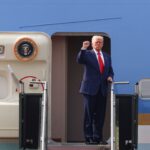
United States President Donald Trump says he has ordered the Department of Defense to “immediately” resume nuclear weapons testing on an “equal basis” with other nuclear-armed powers.
The US leader also said on Thursday that he gave ally South Korea the green light to build its own nuclear-powered submarine after successful trade negotiations with his South Korean counterpart, Lee Jae Myung.
- list 1 of 3Chinese citizens arrested in Georgia, accused of trying to buy uranium
- list 2 of 3North Korea test-fires cruise missiles as Trump visits South Korea
- list 3 of 3Trump wants China’s ‘help’ to deal with wartime Russia. Will he get it?
end of list
Writing on his Truth Social platform shortly before his summit with Chinese President Xi Jinping on the sidelines of the Asia-Pacific Economic Cooperation (APEC) summit in the South Korean city of Busan, Trump said that while the US has “more Nuclear Weapons than any other country”, China “will be even within 5 years”.
Trump added that he ordered the resumption due to “other countries [nuclear] testing programs”.
“I have instructed the Department of War [Department of Defense] to start testing our Nuclear Weapons on an equal basis. That process will begin immediately,” he wrote.
It was not immediately clear whether Trump meant flight testing of nuclear-capable missiles or nuclear-explosive testing, which would be carried out by the National Nuclear Safety Administration.
China has rapidly expanded its nuclear warhead stockpile to about 600 in recent years, adding about 100 per year since 2023, according to the Stockholm International Peace Research Institute. The Pentagon estimated that Beijing will have more than 1,000 operational nuclear warheads by 2030.
The Center for Arms Control and Non-Proliferation (CACNP) estimated that Russia currently possesses 5,459 nuclear warheads, of which 1,600 are actively deployed.
Advertisement
The US has about 5,550 nuclear warheads, according to the CACNP, with about 3,800 of those active. At its peak in the mid-1960s during the Cold War, the US stockpile consisted of more than 31,000 active and inactive nuclear warheads.
Former Republican US President George HW Bush issued a moratorium on nuclear weapons testing with the collapse of the Soviet Union in 1991. The US last exploded a nuclear device in 1992.
Only three countries have detonated nuclear devices since 1996, the year the Comprehensive Nuclear-Test-Ban Treaty was opened for signatures – India in 1998, Pakistan twice in 1998 and North Korea on five occasions.
Trump also announced on Thursday that he had approved US support for South Korea building its own nuclear-powered submarine.
Trump said the move would replace South Korea’s “old fashioned, and far less nimble, diesel powered Submarines”. He added that the submarine would be built in Philadelphia, Pennsylvania, where the South Korean firm Hanwha runs a shipyard.
The dramatic move is set to admit Seoul to a small club of nations that possess such vessels, namely the US, China, Russia, the United Kingdom, France and India.
At their meeting on Wednesday, Lee pushed Trump to revise the countries’ nuclear energy agreement to allow Seoul greater flexibility in reprocessing spent nuclear fuel and uranium enrichment.
The longstanding pact restricts Seoul to enriching uranium to levels below 20 percent, and it is prohibited from reprocessing spent nuclear fuel without US consent.
Lee said revising these restrictions would allow South Korea to have fuel “supply for nuclear-powered submarines”. Crucially, he emphasised that his government was looking for nuclear fuel rather than weapons.
“If fuel supply is permitted, we can build several submarines equipped with conventional weapons using our own technology to defend the waters around the Korean Peninsula, ultimately reducing the burden on US forces,” Lee said.
Trump did not say where South Korea would get the propulsion technology needed for a nuclear-powered submarine. The US has only once before shared that technology – with the UK in the 1950s.
British Caribbean News


